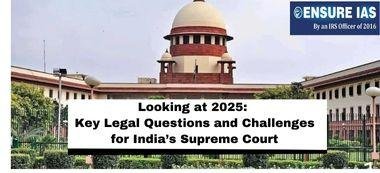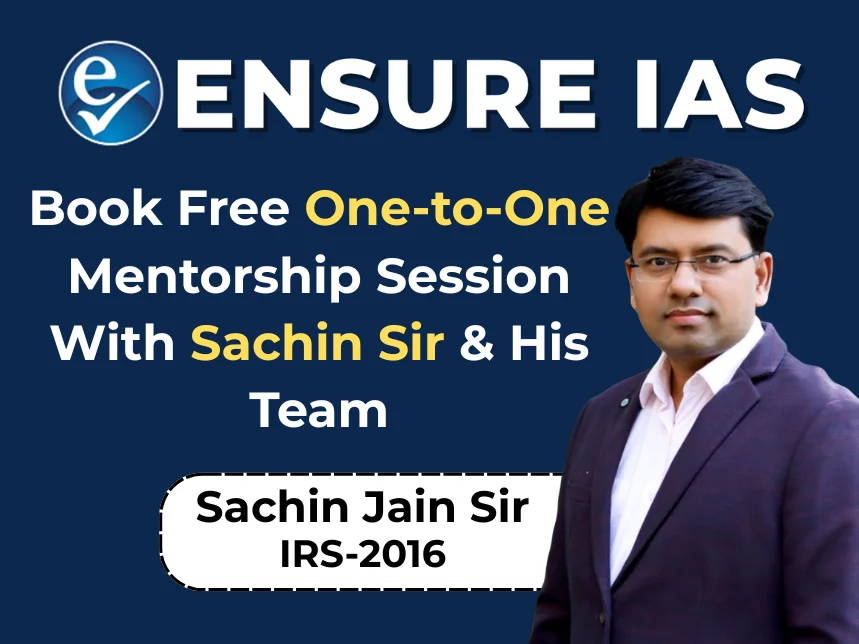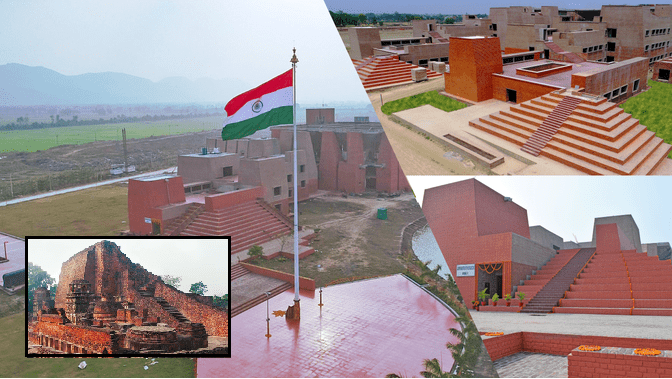- In 2024, political battles outside the courtroom had a significant impact on India’s legal landscape. The Supreme Court has been criticized for “judicial evasion” — avoiding tough decisions, especially when the government has a strong majority.
- Experts argue this happens whenever the ruling government is powerful, but only until the independence of the judiciary is at risk.
- However, 2024 marked a shift, as the Court made some important rulings in politically sensitive cases, showing it was no longer avoiding significant issues.
- As we look to 2025, these legal and political challenges will likely continue to define the Court’s work.
Key Supreme Court Decisions in 2024
The Supreme Court made several high-profile decisions in 2024 that will have a lasting impact:
-
Electoral Bonds Scheme:
- The Supreme Court struck down the electoral bonds scheme, which was introduced in 2018 and allowed political parties to receive anonymous donations.
- The scheme was criticized for lacking transparency, as it allowed large sums of money to flow into politics without clear accountability.
- The Court ruled that the scheme was unconstitutional, an important step towards greater transparency in political funding.
-
Mandir-Masjid Cases:
- The Supreme Court took a firm stance on ongoing mandir-masjid disputes (temple-mosque conflicts) by preventing district courts from registering any new cases related to the ownership and title of religious places.
- This decision followed violence in Sambhal, Uttar Pradesh, after a court ordered a survey of a mosque.
- By issuing this ruling, the Court aimed to prevent further religious conflicts and ensure that such matters are dealt with only by the Supreme Court or High Courts.
-
Bulldozer Demolitions:
- The Supreme Court intervened to stop illegal bulldozer demolitions that had been used, often in a politically motivated manner, to destroy homes and businesses.
- The Court issued guidelines to curb such demolitions, ensuring that they could not be carried out arbitrarily, especially against vulnerable communities.
-
Bail for Opposition Leaders:
- In a highly politically charged case, the Supreme Court granted bail to opposition leaders who had been jailed in connection with politically sensitive charges.
- The Court also criticized the use of Enforcement Directorate (ED) powers, questioning its excessive use of arrest powers in politically motivated cases.
-
Bilkis Bano Case:
- The Supreme Court overturned a remission order by the Gujarat government, which had allowed rapists involved in the Bilkis Bano case (where a gangrape occurred during the 2002 Gujarat riots) to be released early.
- The decision marked a significant moment for justice for sexual violence survivors and was widely seen as a necessary step to ensure fairness.
- In addition to these key rulings, the Court also took up several long-pending cases and brought attention to issues such as the minority status of Aligarh Muslim University and tax policies on industrial alcohol.
What’s Next for the Court in 2025: A Year with Three CJIs
- In 2025, there will be three different Chief Justices of India (CJIs) in just one year:
- Justice Sanjiv Khanna will retire on May 13, 2025.
- Justice Bhushan Ramkrishna Gavai will take over as CJI for 194 days, from May 14 to November 2025.
- Justice Surya Kant will then become CJI in November 2025 and will serve until February 2027.
- With the frequent change of leadership in the Supreme Court, the composition of the Collegium (the group of senior judges that recommends new appointments) will change, which may affect the Court’s ability to address long-term issues such as case backlogs and institutional reforms.
- Justice D.Y. Chandrachud, the previous CJI, oversaw important reforms during his relatively long tenure, including improvements to the Court’s digital infrastructure and the introduction of virtual courts. With shorter tenures for the incoming CJIs, it’s unclear how much they can continue these reforms.
Religious Issues the Court Will Address in 2025
Some of the most important cases in the Supreme Court in 2025 will involve religious issues:
-
Places of Worship Act, 1991:
- The Places of Worship (Special Provisions) Act, 1991 freezes the religious status of all places of worship in India as they stood in 1947 (except the disputed Ayodhya site).
- This law prevents fresh claims about the religious character of any religious place.
- Opponents of the law argue that it is unfair because it stops judicial review of claims and arbitrarily picks August 15, 1947 as the cut-off date for determining the religious character of places.
- Supporters say the law strengthens India’s secularism by preventing religious conflicts. The Supreme Court is expected to hear this challenge and decide on the matter in 2025.
-
Hijab Ban:
- In 2023, the Karnataka government imposed a ban on female students wearing hijabs in schools.
- The case went to the Supreme Court, which gave a split verdict in 2023.
- One judge said the ban violated the right to personal liberty, while the other argued that wearing a hijab is not an essential religious practice.
- The Court will hear this case again in 2025 with a three-judge bench, and the outcome will be key to deciding how the freedom of religion and individual rights should be balanced.
-
Essential Religious Practices Test:
- The Supreme Court has been reviewing its controversial 2018 ruling that allowed women to enter the Sabarimala temple, where women were traditionally not allowed.
- This ruling was based on the idea that only “essential religious practices” should be protected under the law.
- This will affect other cases, such as whether Muslim women can enter mosques and whether Parsi women who marry outside their community can enter the Tower of Silence.
- The Court is expected to revisit the “essential religious practice” test in 2025.
Social Issues and Legal Challenges in 2025
Several important cases related to citizenship, marital rights, and the powers of government agencies will also be heard in 2025:
-
Citizenship (Amendment) Act, 2019:
- Pending Challenge: The challenge to the Citizenship (Amendment) Act (CAA), 2019, is still pending before the Supreme Court (SC).
- Provisions of CAA: The Act amends Section 6B of the Citizenship Act, 1955, granting Indian citizenship to non-Muslim migrants (Hindu, Sikh, Buddhist, Jain, Parsi, Christian) who entered India before December 31, 2014, from Pakistan, Afghanistan, and Bangladesh.
- Exclusion of Muslims: The law excludes Muslims from the eligibility for citizenship, which has sparked legal challenges.
- Grounds for Challenge: The petitioners argue that the exclusion of Muslims violates the constitutional right to equal protection under the law and breaches the principles of secularism.
- October SC Ruling: In October, the SC upheld the Assam Accord and Parliament’s power to set a cut-off date for specific circumstances.
- Fraternity and Plurality: The SC emphasized the idea of citizenship as tied to fraternity and plurality, which will be crucial in the ongoing challenge to the CAA.
-
Marital Rape:
- Split Verdict: In 2022, the Delhi High Court issued a split verdict on the legality of the marital rape exception in criminal law.
- Section 375 of IPC (Indian Penal Code): Defines rape and includes seven criteria for consent. If any of these are vitiated, it constitutes rape.
- Marital Rape Exception: The law includes an exemption: “Sexual intercourse or sexual acts by a man with his own wife, who is not under 18 years old, is not considered rape.”
- This effectively allows a husband to engage in consensual or non-consensual sex with his wife without facing legal consequences.
- Government’s Position: In October, the Indian government stated that while a husband does not have a fundamental right to violate his wife’s consent, calling such violation “rape” would be “excessively harsh and disproportionate.”.
Enforcement Directorate’s Powers:
-
Supreme Court’s Intervention in ED’s Powers
- Context: The Supreme Court raised concerns about the Enforcement Directorate’s (ED) extensive powers to arrest while granting bail to former Delhi CM Arvind Kejriwal in the money laundering case related to the alleged excise policy scam.
- Key Issue: The SC questioned the conditions under which an arrest is legally warranted and referred this matter to a larger Bench for further deliberation.
- Significance: This marks a shift in the judicial scrutiny of the ED’s powers, which had been upheld in a 2022 ruling.
-
Vijay Madanlal Choudhary v. Union of India (2022)
- Background: The 2022 SC ruling largely upheld the ED’s broad powers, including its powers to arrest and the conditions under which it could detain individuals in money laundering cases.
- Current Development: The recent SC referral to a larger Bench questioning the necessity of arrests signals a setback to the ED’s broad mandate as outlined in this landmark verdict.
-
Recent SC Rulings on ED Procedures
- Procedural Safeguards: Since the 2022 verdict, the SC has introduced key procedural safeguards in ED cases:
- Grounds of Arrest: The ED must now inform the accused in writing about the grounds for arrest.
- Bail Conditions: The “twin-conditions” for bail (which previously made it very difficult to obtain bail in money laundering cases) can now be relaxed if the accused has been in custody for a prolonged period.
- Impact: These rulings indicate a growing judicial concern over the ED’s powers and its impact on individuals’ rights.
- Procedural Safeguards: Since the 2022 verdict, the SC has introduced key procedural safeguards in ED cases:
-
Pending Review of Vijay Madanlal Choudhary Ruling
- Pending Review: The Vijay Madanlal Choudhary case is under review, and this is seen as an opportunity for the Supreme Court to limit or circumscribe the ED’s powers.
- Future Implications: This review could significantly alter the scope of the ED’s authority, especially with respect to arrests and bail conditions, ensuring a balance between effective law enforcement and individual freedoms.
-
Broader Implications:
- The ongoing review reflects the delicate balance between combating money laundering and safeguarding fundamental rights.
- A shift in the legal landscape could prompt significant changes in how the ED operates, impacting its ability to conduct investigations and arrests in the future..
Key Legislative Reforms and Future Legal Challenges
-
One Nation, One Election:
- A proposal for simultaneous elections to the Lok Sabha (lower house of Parliament) and state assemblies is being considered.
- The Supreme Court may be asked to rule on the constitutional validity of this proposal in 2025.
- Critics argue that it may weaken the federal structure and disrupt local governance.
-
Sub-Classification of Scheduled Castes:
- In 2024, the Supreme Court allowed states to create sub-quota systems within the Scheduled Castes (SC) and Scheduled Tribes (ST) quotas for jobs and education.
- This would allow states to give extra protection to certain sub-castes.
- This reform could reshape the operation of quotas, providing more targeted benefits.
- For the first time since 1950 (when the Constitution was enacted), affirmative action quotas might be reframed.
- Potential for political and legal challenges as it touches upon issues of equality and caste-based reservations.
-
New Criminal Laws:
- Bharatiya Nyaya Sanhita, 2023 (replaces Indian Penal Code, 1860)
- Bharatiya Nagarik Suraksha Sanhita, 2023 (replaces Criminal Procedure Code, 1973)
- Bharatiya Sakshya Adhiniyam, 2023 (replaces Indian Evidence Act, 1872)
These new laws are part of the Indian government’s broader objective to “decolonise” the criminal justice system. This decolonisation refers to moving away from the colonial-era laws inherited from British rule.
Progressive Elements in the New Laws
The new laws contain several progressive and forward-thinking elements aimed at modernizing the criminal justice system:
- Introduction of community service as an alternative form of punishment, offering an option for reformative justice.
- Summary trial is now mandatory for petty offences, enabling faster resolution of minor cases.
- Allows trials to be conducted via video conferencing, enhancing accessibility and reducing delays.
- New provisions prescribe strict timelines for the speedy completion of trials, aiming to reduce backlogs and delays in the judicial process.
- Mob lynching and child marital rape have been introduced as specific offences under the new laws, reflecting contemporary concerns and justice needs.
Controversial and Problematic Provisions
Despite its progressive features, the new laws have been met with criticism, especially concerning several provisions that may have significant implications:
-
Sedition Law:
- The colonial-era sedition law (previously referred to as “rajdroh” in Hindi) has simply been renamed to “deshdroh” without substantial change in its application.
- Critics argue that this could lead to continued misuse of the law for political purposes, particularly against dissent or criticism of the government.
-
Police Investigation and FIR Registration:
- The new laws allow a police officer 14 days to conduct a preliminary investigation before registering an FIR.
- This could lead to unnecessary delays and may provide an opportunity for cases to be dismissed without proper investigation.
-
Exclusion of Section 377:
- Section 377 of the Indian Penal Code, which had previously offered protection to men and LGBTQIA+ individuals against non-consensual sexual intercourse, has been completely excluded.
- This raises concerns regarding the protection of sexual rights and consent.
-
Extended Detention Period:
- The period of detention has been extended to up to 90 days without trial.
- This could be seen as an infringement on individual liberties and human rights, particularly in cases where the evidence for detention is not yet fully substantiated.
Legal Challenges and Judicial Review
-
- Several provisions of these new laws have already been challenged before the Supreme Court of India (SC), particularly the sedition law and other contentious measures.
- These challenges focus on the potential for misuse of power and violations of fundamental rights.
- Likely Judicial Review:
- As the implementation of these new laws progresses, further challenges are likely to arise.
- The judicial review process will be crucial in addressing concerns related to constitutional validity and human rights protection.
- Key Areas for Review:
- Sedition law (deshdroh): Whether the law remains excessively broad and prone to misuse.
- Police investigation timeline: Whether 14 days is an unreasonable or excessive delay.
- Exclusion of Section 377: Whether this exclusion undermines the rights of LGBTQIA+ individuals.
- Extended detention: Whether a 90-day detention period without trial violates constitutional protections against arbitrary detention.
Uniform Civil Code:
- The Uniform Civil Code (UCC) is being implemented in Uttarakhand from January 2025.
- The UCC aims to create one law for all citizens, replacing personal laws based on religion.
- While some see this as a step towards equality, others argue it violates individual rights.
- The Supreme Court will likely review these laws in 2025, especially in the context of the right to privacy and personal freedom.
Conclusion: 2025 and Beyond
As India heads into 2025, the Supreme Court will be at the center of many crucial debates and challenges involving religion, citizenship, individual rights, and the balance of power between the state and the people. With three different Chief Justices in one year, the Court’s decisions could shape the future of India’s legal system. How the Court handles these sensitive issues will impact the nation’s politics and social fabric for years to come.








